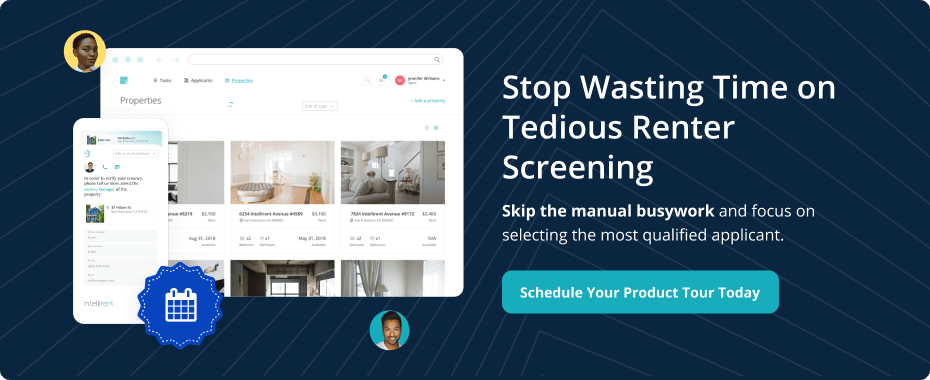July 06, 2023 • 5 min read

When it comes to renting out your property, reliability is everything. You need tenants who will pay rent on time, take care of your property, and respect your rules. One wrong decision can cost your business time and money, creating reputational damage far more complicated to repair than a damaged unit.
How do you find reliable tenants? Effective tenant screening is the answer. By thoroughly vetting potential tenants, you can get a clear picture of their rental history and financial stability. This can help you make an informed decision and select qualified tenants who are responsible and dependable.
It can be tempting to cut corners when it comes to screening, especially if you need to fill your open vacancy quickly or don’t know where to start. Don’t! High-quality renters are essential for peace of mind and real estate success.
Just get some help (thankfully, you’re in the right place!). We've collected seven tenant screening tips to streamline your process and find dependable tenants.
The Importance of a Robust Tenant Screening Process
Your tenant screening process is how you evaluate potential tenants before accepting–or rejecting–their rental application. The typical screening process involves using a manual method or modern tenant screening tool to gather information on a tenant's rental history, credit score, employment status, and criminal background.
A thorough tenant screening process helps identify red flags or potential risks that might impact your ability to collect rent, maintain your property, and keep a strong reputation as a company people want to rent from. Without it, you might miss clear warning signs–like past evictions or financial job instability– that might negatively impact your business.
Tenant screening services like Intellirent help owners and property managers (PMs) minimize risk and make informed tenant decisions. Our platform streamlines the screening process and provides access to credit reports, criminal records, eviction histories, and more. Our technology also makes verifying employment and income information easy, saving time and reducing fraud.
7 Must-Have Steps to Include in Your Tenant Screening Process
Here are seven must-have steps to include in your screening process to optimize your tenant screening process and find reliable tenants.
1. Screen Every Applicant, Identically, Every Time
We’ve all heard the age-old phrase, “Practice makes perfect.” This mentality applies to your tenant screening process. An established process helps your business follow a fair and consistent internal process. This means you collect the information from every applicant and use the criteria to evaluate each.
Don't make exceptions for applicants who look perfect on paper - everyone should be subject to the same screening process. It's also necessary to avoid discrimination and potential legal issues. Treating all applicants equally and following a consistent process lets you minimize the risk of bias and make fair decisions about who to rent to.
2. Trust but Verify
Income and employment verification should be two vital components of your tenant screening process because it ensures that that applicant has the financial means to pay rent consistently. In addition, talking to previous landlords and employers can reveal valuable information beyond paper reporting because it gives insight into that person’s character and behavior.
Be careful not to let bias slip in: the focus of verification should be on consistency and stability to avoid potential problems and minimize the risk of lost income or property damage.
3. Communicate Your Criteria
Once you've set your rental criteria, clearly communicating them to all prospective renters is essential. (If you’re unsure how to establish rental standards, check out this blog post). Try including them in your rental application materials or posting them on your website and in shared spaces.
Clearly sharing your criteria with applicants helps them understand expectations and decide whether or not they want to apply for your property. Whether they apply or not, you’ll likely significantly reduce the number of unqualified applicants by stating requirements clearly and up-front.
4. Secure All Documents
As a property owner or manager, you’re responsible for ensuring your applicant’s documents are kept secure and confidential. This helps maintain compliance with relevant privacy laws and demonstrates your commitment to protecting your applicant’s information. In addition, good security lets you establish trust and credibility with potential renters early on and protects your business from potential legal or reputational harm.
What do secure and confidential actually mean? Regarding sensitive documents, it requires secure storage practices for documents like password-protected online storage solutions or keeping physical files in a locked cabinet or safe. Controlling who has access to these documents and limiting authorized access is another way to ensure security.
5. Read Beyond the Credit Report
While credit scores can provide valuable information about an applicant's creditworthiness, be careful not to rely on them at face value. Reviewing a whole credit report gives you a more complete understanding of an applicant's financial situation. It lets you make more informed decisions to mitigate potential problems down the line. For example, payment history shows the applicant's track record of paying bills on time, and late or missed payments might be red flags.
6. Know the Local Laws
Researching state laws helps you understand your obligations as a property owner or manager and protects you from legal liability, and ensures compliance. To explore state laws, consult state-specific renter-tenant resources like your state's official website or relevant government agencies. City and local apartment or homeowner associations can be helpful, too.
These resources offer information on relevant laws, regulations, and guidelines. It's also essential to stay up-to-date with any changes in local laws or regulations that may impact your property, like rent control laws, eviction moratoriums, or other policies. Keeping up-to-date with local laws is especially important since changes can occur frequently and with little notice.
7. Use Tenant Screening Software
Last but certainly not least, eliminate friction in your tenant screening process by automating manual tasks. Automating the screening process saves you time and resources and also provides reliable, secure information about prospective tenants.
Online tenant screening platforms let you minimize the risk of data breaches and protect applicants’ sensitive information. They also streamline collaboration with other team members–like co-listing agents, tenant representatives, and apartment associations– and applicants. The smoother and more efficient the application process you can create, the better tenant screening experience you and your applicants will have.
Streamline Your Tenant Screening Process with Intellirent
Using these seven tips to implement a robust tenant screening process helps you protect your properties and reputation, avoid legal issues, and ensure you rent to reliable tenants.
When coupled with Intellirent, your team will reach the next level. Intellirent has features like vacancy marketing, customizable rental applications, rapid response income, credit, and rental history verification, and document management to offer a complete and accurate picture of a tenant's financial and rental history.
The more information you have, the better you can make smart decisions, improve efficiency, and reduce errors to create a seamless and reliable tenant screening experience. To learn more about how Intellirent can streamline your leasing process, schedule a product tour.
Published by Kathleen Castro
July 06, 2023
Related Articles
August 01, 2023 • 6 min read
April 06, 2023 • 5 min read
Subscribe For Insights
Get actionable leasing tips, tools, and best practices directly to your inbox. Don't miss out on the insights that'll help your team confidently find, screen, and approve the most qualified renters.


.jpg)